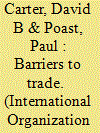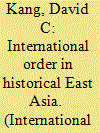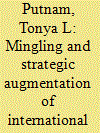|
|
|
Sort Order |
|
|
|
Items / Page
|
|
|
|
|
|
|
| Srl | Item |
| 1 |
ID:
171170


|
|
|
|
|
| Summary/Abstract |
Since trade must cross borders, to what extent do border walls affect trade flows? We argue that border walls can reduce trade flows. Even if the objective is to only stem illicit flows, border walls heighten “border effects” that can also inhibit legal cross-border flows. Using a gravity model of trade that reflects recent developments in both economic theory and econometrics, we find that the creation of a wall is associated with a reduction in legal trade flows between neighboring countries. We provide a battery of evidence that suggests this reduction is not simply a function of worsening bilateral relations. Our findings have implications for understanding how governments have taken measures to assert sovereign control of their borders in an age of increasing economic globalization.
|
|
|
|
|
|
|
|
|
|
|
|
|
|
|
|
| 2 |
ID:
171169


|
|
|
|
|
| Summary/Abstract |
How do international observers decide whether to criticize or condone electoral fraud in a country? We argue that this decision depends on the identity of the victims of electoral fraud. A monitoring organization is more likely to overlook fraud committed against groups that are deemed dangerous by its sponsor. Based on this insight, we hypothesize that in the post-Cold War era election monitors are more tolerant of fraud against Islamic challengers, especially when Islamic movements are perceived as a threat to political stability. In support of our hypothesis, we find that outside monitors are more likely to endorse an election in countries with an Islamic opposition party and an ongoing Islamist terrorist campaign. Furthermore, we find that the effect is driven by Western monitoring organizations and becomes stronger after the September 11 attacks. Our findings provide a simple yet powerful insight: the calculus of outside observers depends not only on who they wish to see in power, but also who they want to keep from power.
|
|
|
|
|
|
|
|
|
|
|
|
|
|
|
|
| 3 |
ID:
171166


|
|
|
|
|
| Summary/Abstract |
IR theorizing about international order has been profoundly, perhaps exclusively, shaped by the Western experiences of the Westphalian order and often assumes that the Western experience can be generalized to all orders. Recent scholarship on historical East Asian orders challenges these notions. The fundamental organizing principle in historical East Asia was hierarchy, not sovereign equality. The region was characterized by hegemony, not balance of power. This emerging research program has direct implications for enduring questions about the relative importance of cultural and material factors in both international orders and their influence on behavior—for describing and explaining patterns of war and peace across time and space, for understanding East Asia as a region made up of more than just China, and for more usefully comparing East Asia, Europe, and other regions of the world.
|
|
|
|
|
|
|
|
|
|
|
|
|
|
|
|
| 4 |
ID:
171165


|
|
|
|
|
| Summary/Abstract |
Managing foreign affairs is in no small measure about anticipating the actions (and non-actions) of others, and about taking steps to limit the unexpected—and the undesired. Law has long been recognized as important to these tasks. Nevertheless, standard IR treatments often overlook important properties of law, even when trying to account for international law's effects on behavior. Chief among these overlooked properties is the fact that legal rules are formulated for general use, which means their provisions lack determinate meaning in relation to the full range of facts they may be applied to. Selecting and using legal rules to guide or assess behavior thus requires interpretation. Self-interested actors may differ regarding the applicability, scope, or meaning of individual rules, and still more so where multiple legal rules are in play. In situations where political stakes are high, powerful actors may not be content to leave all options on the table. Instead they may use interpretative tactics to mingle obligations from different agreements and, where needed, to augment relevant legal obligations in efforts to prospectively ensure, in the mode of Riker's heresthetics, that interlocutors feel compelled by legal circumstances to enact the more powerful actor's preferences. I demonstrate how agreement mingling and augmentation function in complex legal environments by reexaming US efforts to insulate its citizens from unwanted exercises of jurisdiction by the International Criminal Court (ICC).
|
|
|
|
|
|
|
|
|
|
|
|
|
|
|
|
| 5 |
ID:
171164


|
|
|
|
|
| Summary/Abstract |
IMF loans during times of financial crisis often occur in conjunction with bilateral financial rescues. These bilateral bailouts are substantial in size and a central component of international cooperation during financial crises. We analyze the political economy of bilateral bailouts and study the trade-offs that potential creditor governments experience when other countries find themselves in financial distress. Creditor governments want to stabilize crisis countries by providing additional liquidity, particularly if the crisis country is economically or politically important to them, but they are constrained by domestic politics. Politicians aim to balance these countervailing pressures. They provide bailouts when their own economy is exposed to negative spillover effects and when the crisis country is important for geostrategic, military, or political reasons. Domestic economic and political constraints, on the other hand, limit their ability to bail out other countries. We test our hypotheses using an original data set on bilateral bailouts by the G7 countries to countries that experienced financial crises between 1975 and 2010. The findings of our statistical analysis support our theoretical argument and contribute to a deeper understanding of international cooperation's complex structure during financial crises.
|
|
|
|
|
|
|
|
|
|
|
|
|
|
|
|
| 6 |
ID:
171167


|
|
|
|
|
| Summary/Abstract |
Canonical models of costly signaling in international relations (IR) tend to assume costly signals speak for themselves: a signal's costliness is typically understood to be a function of the signal, not the perceptions of the recipient. Integrating the study of signaling in IR with research on motivated skepticism and asymmetric updating from political psychology, we show that individuals’ tendencies to embrace information consistent with their overarching belief systems (and dismiss information inconsistent with it) has important implications for how signals are interpreted. We test our theory in the context of the 2015 Joint Comprehensive Plan of Action (JCPOA) on Iran, combining two survey experiments fielded on members of the American mass public. We find patterns consistent with motivated skepticism: the individuals most likely to update their beliefs are those who need reassurance the least, such that costly signals cause polarization rather than convergence. Successful signaling therefore requires knowing something about the orientations of the signal's recipient.
|
|
|
|
|
|
|
|
|
|
|
|
|
|
|
|
| 7 |
ID:
171168


|
|
|
|
|
| Summary/Abstract |
Many theories of international relations assume that public opinion exerts a powerful effect on foreign policy in democracies. Previous research, based on observational data, has reached conflicting conclusions about this foundational assumption. We use experiments to examine two mechanisms—responsiveness and selection—through which opinion could shape decisions about the use of military force. We tested responsiveness by asking members of the Israeli parliament to consider a crisis in which we randomized information about public opinion. Parliamentarians were more willing to use military force when the public was in favor and believed that contravening public opinion would entail heavy political costs. We tested selection by asking citizens in Israel and the US to evaluate parties/candidates, which varied randomly on many dimensions. In both countries, security policy proved as electorally significant as economic and religious policy, and far more consequential than nonpolicy considerations such as gender, race, and experience. Overall, our experiments in two important democracies imply that citizens can affect policy by incentivizing incumbents and shaping who gets elected.
|
|
|
|
|
|
|
|
|
|
|
|
|
|
|
|
|
|
|
|
|